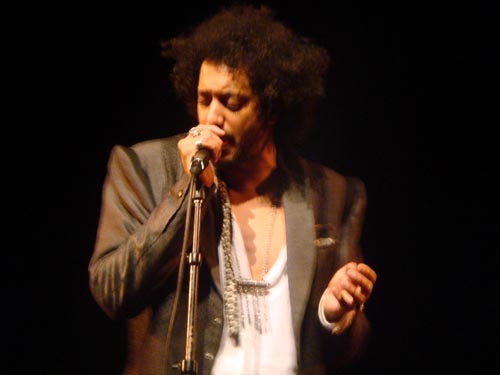I saw (and interviewed) Yemen Blues back in March, when they did a set for the Boston Jewish Music Festival. Their album hadn’t come out yet, but live they were a tight band, experienced sounding. Their album came out a few days ago and I copped it, mostly on the strength of that concert. Considering it’s an hour long, ten dollars is not a bad price.
“We recorded the CD live in one room, nothing between us. I like it more this way, live in studio.”
The band’s leader Ravid Kahalani told me this. The production on Yemen Blues is fairly basic, but it’s well done. Kahalani’s nasal, Yemenite vocals are far up in the mix, along with the basslines and the percussion. Afropop sounding horn blasts fill in the mid range. Without chord progressions, most of the songs are structured around the basslines, short melodic figures that remind me of 1960s pop groups.
The songs themselves are complicated pieces, most of them going longer than 5 minutes, with time signature and tempo changes taking the place of modulations. The intro track “Wamid”, where fuzzed out vocals (or is it a guitar?) provide the backup for Kahalini’s improvised sounding singing starts the album strong, and the overall sound is very distinctive, which is always a huge plus in world music. For me though, without enough (any) knowledge of Hebrew and Arabic to understand the lyrics, I got tired of a lot of the faster material that dominates the middle of the album, where everything turns into a fast jam. Still, the switch from eerie wailing over slow strings to spaghetti western menace on the title track is striking. And the Bo Diddley beat on “Un Min Al Yaman” is sublimely executed. The slowest track on the album, “Trap La Verite”, reminds me of Sam Cooke’s A Change is Going to Come, with the interplay between horns and strings– but Kahalani’s piercing vocals keep this music unmistakably middle eastern.
“We found some kind of musical language…”
Overall, it’s a strong first album, although like Kahalani said, they’re more of a live band, for now at least. The same songs that are high-energy live can be taxing on the ear on record, especially after three of them in a row. And, like many first albums, it feels crammed, with more ideas per song than the listener can easily process (although this may partly be because of the language barrier.). No question though, it shows a lot of promise, the way Kahalani integrates his different influences with a distinctive composing style, and the way it modernizes traditional Yemenite music. I’m definitely putting a lot of the songs on replay status. #Cosign.


